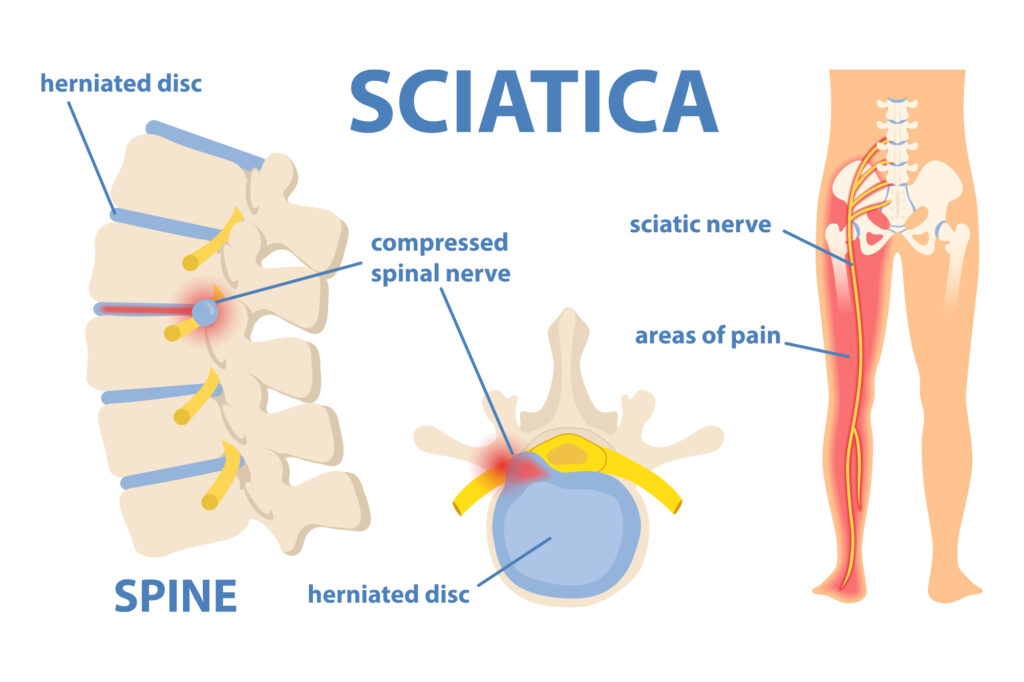Disc bulges or herniations are a common and often debilitating problem. Spinal discs act as shock absorbers between each of the vertebrae in the spine. The disc has a tough outer covering and a thick gel-like material on the inside. When the tough outer fibers break down and weaken some of the disc’s gelatinous contents may bulge outward and press on the nerve roots or central nerves running through the central canal where the spinal cord lives. This can produce serious back and leg pain, as well as, numbness, tingling, and muscle weakness.
Spinal Decompression is one of the most effective and conservative therapies. It is non-invasive, affordable and a great place to start before considering other more permanent solutions. When combined with ice, chiropractic manipulations, electric stimulation, strengthening exercises and possible laser therapy – we find that many disc problems can be resolved.
Herniated discs can cause symptoms such as radiating pain into the arm or leg(sciatica), numbness/tingling, muscle twitching/weakness or spasms. However, these symptoms are not always associated with herniated discs. It is best to be diagnosed by a professional. Disc bulges need to be taken seriously because if left untreated they can lead to possible permanent nerve damage, continued degeneration, and eventual surgery.
Technically, a disc can’t “slip.” The intervertebral disc is a pad of cartilage-type material situated between spinal bones. Each disc serves as a connector, spacer and shock absorber for the spine. A soft, jellylike center is contained by outer layers of fibrous tissue. Healthy discs help allow normal turning and bending. Because of the way each disc is attached to the vertebrae above and below, a disc cannot “slip.” However, trauma or injury to the spine can cause discs to tear, bulge, herniate, or worse, rupture. This can be quite painful, as the soft center of the disc leaks, putting pressure on the adjacent nerve roots and spinal cord. Many patients have avoided needless surgery or a dependency on pain pills, by choosing chiropractic care for their disc-related health problem.
Sciatica is caused by irritation of the root(s) of the lower lumbar and lumbosacral spine. Sciatica is a common type of pain affecting the sciatic nerve, a large nerve extending from the lower back down the back of each leg. It usually affects only one side of the lower body, and depending on where the sciatic nerve is affected, the pain may also extend to the foot or toes. For some people, the pain from sciatica can be severe and debilitating. For others, the sciatica pain might be infrequent and irritating, but has the potential to get worse. Seek immediate medical attention if you have progressive lower extremity weakness, numbness in the upper thighs, and/or loss of bladder or bowel control.

The medical profession would recommend bed rest or “watching and waiting” coupled with medications. This could take weeks and months to make any progress towards healing. To find and correct the cause of the problem Dr. Hall uses chiropractic adjustments, soft tissue work, spinal decompression, and therapeutic exercises and stretching to resolve sciatic pain. A large percentage of the cases we see respond well to these conservative and affordable treatments.
MONDAY
8:00am – 6:00pm
TUESDAY
By Appointment
WEDNESDAY
8:00am – 6:00pm
THURSDAY
2:00pm – 6:00pm
FRIDAY
8:00am – 12:00pm

10352 S. River Heights Dr. #102,
South Jordan, UT 84095
Bodyworkschiro © 2024. All Rights Reserved.